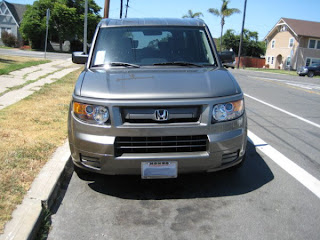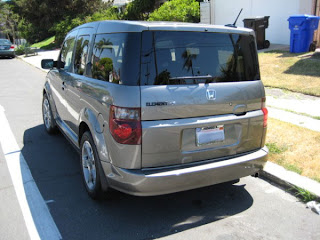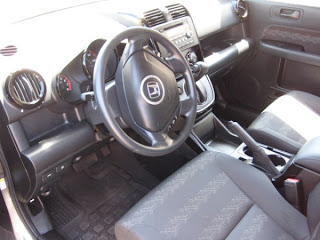I wanted to share a great riff Seth Godin had about retail packaging. While it doesn't directly have anything to do with transportation, I think you'll find some salient points (and, if you don't, I'll help you out). From Seth's blog:
Item 1: My Logitech cordless remote (which I like a lot) came in plastic, non-recyclable packaging that weighed twice as much as the remote itself.* The plastic was so well sealed and so thick that I actually broke a kitchen knife trying to open it. (*this is not hyperbole. I weighed it).
This is expensive, time-consuming and positions the product as extremely ungreen.
This packaging is the result of a paranoid retail buyer (the person who orders in bulk for the store, not the buyer at retail) demanding pilfer-proof packaging combined with a lazy brand manager choosing a lousy solution to the challenge presented by getting it into a retailer. "Make it pilfer-proof or we won't carry it," he says. The brand manager doesn't want to take a risk, so she packages it the way they packaged it when the device cost $1,000. Impregnable.
True story or what?
The more packaging, the more waste. Not only that, the more packaging the more material is needed and the more manufacturing goes into it. Bigger boxes means more space, more space means more trucks/planes/boats to move the stuff around. Bigger boxes means more stuff inside which means more waste and more weight and more transportation.
Now let's apply this notion to transportation. Everyday, I'm passed on the freeway by people who go to fast in cars, trucks, and SUVs that are too big for their needs. Without turning this into a bashing session on SUVs, the question must be asked: why are we moving around a bunch of extra cubic feet that aren't needed most of the time? Also, why does these cubic feet need to be moving so fast (or have the potential to [think engine size])?
Seth posed a solution to this problem:
When you buy it from Amazon, of course, a cardboard sleeve would be sufficient. The manufacturer, though, only wants to have one sku, so Amazon sells the wasteful one as well.
So, why not compromise and shrink wrap it to a cardboard backad? A simple piece of cardboard, 8 x 10, impossible to fit under your jacket, much lighter, easy to recycle, cheaper and easier to ship.
The packaging versus transportation issue seems to have more in common beyond the idea of wastefulness. Seth points out two problems: un-green packaging and shoplifting. The un-green packaging solves (does it?) the shoplifting problem but creates a new problem in the process. Seth's solution? Minimal packaging that is still oversized and, thus, harder to smuggle out of the store.
Among many other small problems, I see the big issues with sustainable transportation in a similar light. We have two major problems: a wasteful, destructive way of moving things and people around and a need to move a lot of things and people around. How can this problem be solved?
The sacrificers among us (a small minority at best) alter our needs and lifestyle to contribute to the solution as best as we can. Some of us give up cars and ride the bus/train, some take up cycling and walking and encourage others to do the same. Some blog about it, do what we can in our own lives, and give up some of our wants for the greater good. We feel good about what we doing, we offset some (if only a very tiny bit) of the waste that is happening, and our lives are possibly, because of the increased exercise, better food, and less time in traffic, just a little bit better.
But the sacrificers show us that the problem will not be solved by a sudden, global, self-less rejection of the luxuries that are available. We simply cannot depend on the good-nature and kindness of human beings, it's not an exit plan for global warming.
So, our transportation packaging needs to change.
People should still be able to buy, own, and operate large vehicles. An Expedition has it's place in society but that place is a family of 5 and enough gear for a week or 8 people in a carpool. One person commuting long distances using a V8 engine pulling 4,000+ pounds is simply ridiculous these days and will continue to increase in ridiculousness as time goes on.
One way to solve this problem is to restrict large vehicle usage. Anything over a certain weight/height has a separate speed limit and a designated lane on the freeways. This would address the safety issue of a small, light cars sharing freeway space with big, heavy trucks and SUVs.
This could help people feel more comfortable to buy a smaller car in the future or possibly buy a second used car for commuting. It makes perfect sense to own a large vehicle for your large vehicle needs and one or two small cars for running about town or traveling to work. Now, people are still commuting, everyone still has the freedom they once had, and we're still a mobile, viable economy but we're all PACKAGED different on the road. The "road environment" is different making it much easier to adopt a new way of doing things.
Another way to help this packaging issue is to promote lighter vehicles with less horsepower. One of these is the Dodge Sprinter, an ugly but useful vehicle that has become very popular in Europe.
These vans have a small, clean diesel engine with low horsepower that gets things where they need to go. They are maneuverable around the city, hold A LOT of stuff, and are very economical (30 MPG) for their size/utility.
Think about it...what packaging affects you? What are you packaged in? Can the job be done with less packaging?




.jpg)

